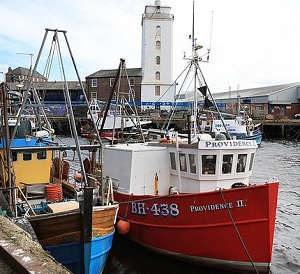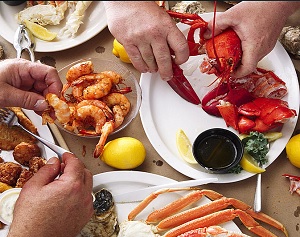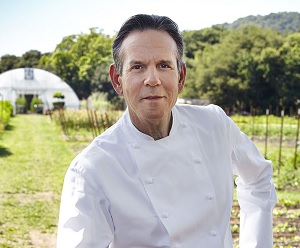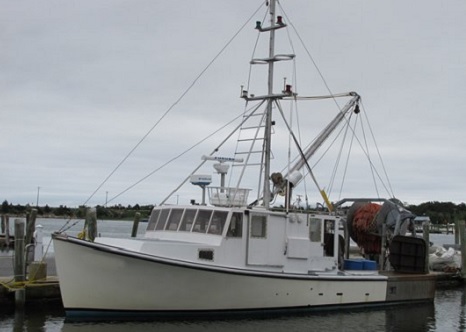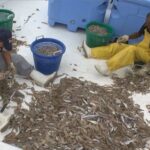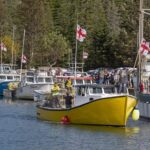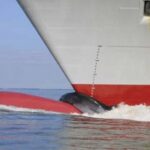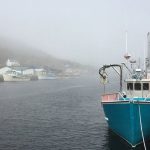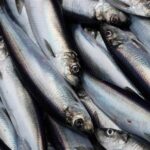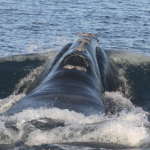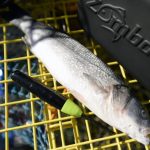Monthly Archives: April 2020

Frustration with DFO growing over P.E.I. lobster fishery – ‘They’re really putting an unfair burden on the industry’
P.E.I. Premier Dennis King says lobster fishermen are being asked to make an impossible choice and Ottawa needs to step up and support them. The lobster fishery off P.E.I.’s North Shore is scheduled to begin at the beginning of May, and the federal Department of Fisheries and Oceans has said it will take the guidance of the industry in deciding whether to start the season on time, delay it or cancel it altogether in the face of the COVID-19 pandemic. But King said the choice is not a fair one, with loss of income on one side and uncertain health risks on the other. >click to read< 12:57
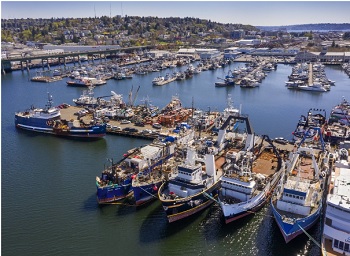
As Alaska fishing season set to begin, fearful communities and seafood industry try to prevent spread of coronavirus
Trident and other seafood-company officials hope to ensure that factory trawlers making their way through remote swaths of the Bering Sea do not replay any of the harrowing scenarios that unfolded on cruise ships this year, when waves of the virus sickened passengers. “The chance of having one hiccup — it’s going to ruin the season for everyone,” Hall said. “The boat has to be virus free.” Processors face another daunting challenge in launching salmon operations in remote Alaska communities, many of which suffered losses in the flu pandemic of more than a century ago and are fearful of thousands of seasonal workers spreading COVID-19. photos, >click to read< 11:43
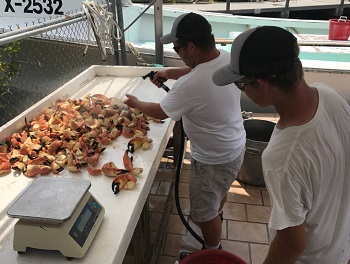
First a hurricane, then an algae bloom. Now Keys fishermen try to weather the coronavirus pandemic
This day’s haul was a good catch — hundreds of claws ranging in size from large to “colossal.” But this was among the last trips the crew of the Risky Business II will make this season to harvest the Florida delicacy. With restaurants mostly closed due to the coronavirus pandemic, Piton and most other Keys commercial anglers are calling it an early season, which is scheduled to end May 10. Piton, 54, has been in the lobster and crab business for nearly 40 years and is among the most successful operators in the Keys. He said he’ll be able to weather the pandemic, but he feels for the many other commercial anglers who won’t. video, >click to read< 10:37

Gulf lobster fishermen offer to give up season
“Three dollars a pound is what we’re hearing,” said Susan Beaton. The Cape George, Antigonish County fisher was working on her new tiny home on Thursday. It looks out over the grounds she fishes each spring from her boat The UnManned. Water she doesn’t know if she’ll be fishing in two weeks. None of the 600 lobster fishermen along most of the Northumberland Strait and the Eastern Gulf of St. Lawrence do. “We need an answer last Friday,” said Duane Boudreau on Thursday. The president of the Gulf Bonafide Fishermen’s Association wants a ruling from Fisheries and Oceans Canada on whether there will be a season this year. >click to read< 10:06
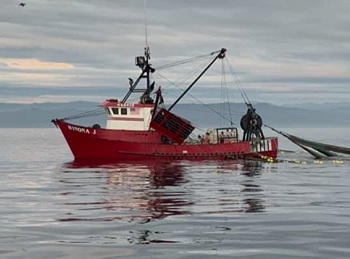
Coronavirus: Oregon fishing industry weathering the storm
For the people who fish, the distributors, and the restaurants, Gov. Brown’s stay-home order has been costly. “The hardest part about all of this is the uncertainty,” said commercial fisherman Mike Retherford. Normally, you’d find Retherford out on his boat the Winona J. But these days he’s spending a lot more time at his home in Newport sheltering in place. “If this goes on for too long you could see business down 40-50%,” he said. But what was looking really grim a couple weeks ago when crab prices dropped from about $7 a pound down to about $2 is now looking a bit better. The price of crab has rebounded as distributors find new ways to market. >click to read< 07:52
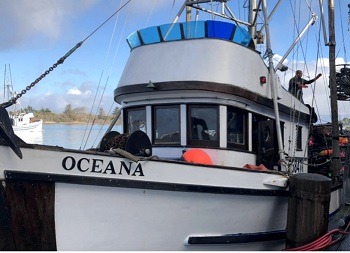
Coronavirus: Seafood Industry Comes to ‘Screeching Halt,’ But Some Businesses Adapting
Harrison Ibach, a commercial fisherman based out of Eureka in Humboldt County, says that when the coronavirus hit the U.S., his business dried up practically overnight. “Oh, man, the seafood industry has pretty much come to a screeching halt,” Ibach said. Since 2008, he’s fished for black cod, rockfish, salmon and crab out of the Woodley Island Marina. Most of his catch goes to high-end fish restaurants in San Francisco. But now, Ibach says, those restaurants aren’t buying. “We now know that the vast majority of Americans really enjoy seafood,” Ibach said, “But we’ve also learned that they really enjoy eating seafood at restaurants.”,, Ibach, who has a wife and two young children, says he has gotten creative in response. He recently started to sell fish directly off his boat, >click to read< 20:19
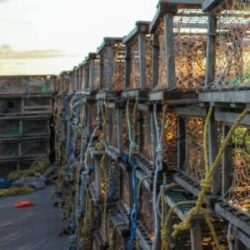
Tignish lobsterman Dryden Buote – Let us go fishing
There can be no doubt that a spring lobster fishery must take place this year in P.E.I. and will be viable, for those who are able to fish and have a place to sell their catches. The government has already announced what will be available to fishers who suffer a loss of income should they not be able to fish and sell their catches this season. (1) They may apply for a loan through Farm Credit Canada to supplement any loss of income and to pay for miscellaneous expenses they may have already incurred before their traps are even in the water. In addition this loan could be used to pay wages to those who work on boats as fisher’s helpers. I stress that this is a loan, money which will need to be paid back in the future. Do fishers need another payment in future years? I am admittedly no economist, but taking on more unnecessary debt does not seem to be a good business decision. (2) ,, >click to read< 15:55
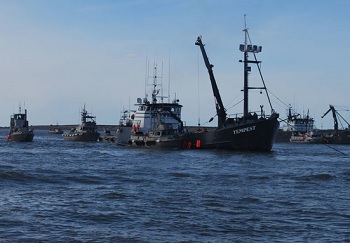
ADF&G: Safe conduct of Alaska salmon fisheries is possible during coronavirus crisis
Alaska Department of Fish and Game Commissioner Doug Vincent-Lang said in an interview that he is certainly aware of the issues that could arise from holding spring and summer salmon fisheries that start next month as everyone also attempts to limit the spread of the disease, but he stressed state officials are drafting plans to provide extra protection to local residents and fisheries workers. He also noted that salmon is just one sector of the state’s diverse and year-round fishing industry. “I think people are wondering whether we’re going to have fisheries; I think they forget that we actually have a lot of fisheries in the water right now and we’re geared up to manage those,” Vincent-Lang said. >click to read< 13:07
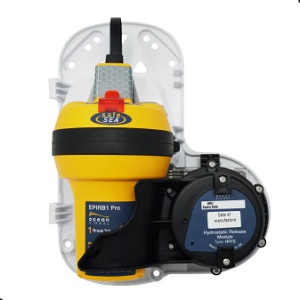
Ocean Signal Introduces Compact Float-Free EPIRB
The new EPIRB1 Pro features a 30 percent reduction in size compared to other EPIRBs, a 10-year battery life and a retail price that makes it one of the most affordable EPIRBs on the market. Providing an essential link to emergency services for both recreational and commercial vessels, the Ocean Signal beacon complies with IMO regulations that require an automatic release housing to be provided for mandatory fitted EPIRBs. The SafeSea EPIRB1 Pro is designed to release automatically from the Category 1 Auto Deploy Bracket once submerged in water and float free from a sinking vessel. (This device has not been authorized as required by the rules of the FCC in the United States. This device is not, and may not be offered for sale or lease, or sold or leased, until authorization is obtained.) >click to read< 10:16
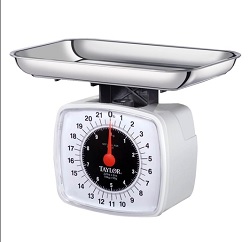
City of Morro Bay will allow fishermen to sell directly from boats starting May 1
“We have about 90 active boats fishing commercially,”,,”If the restaurants and the state doesn’t reopen, the fishermen are going to have to sell directly off their boat to the consumer,”. The City of Morro Bay has already approved for that to happen starting May 1, as long as social distancing is maintained. As of May 1, anyone will be able to buy whole salmon, rock fish and crab from the commercial fishing boats docked in Morro Bay Harbor. The fish will be sold whole, not filleted. Hafer says to look for signs in the harbor and along the Embarcadero directing you to the boats selling fish. Also, remember to bring an ice chest and plenty of ice. >click to read< 08:43
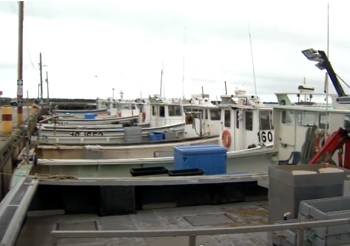
Coronavirus: ‘Extremely difficult’ for fishing industry to maintain health protocols if season proceeds: union
“Truth be told, it’s going to be extremely difficult,” says Martin Mallet, the executive director of the Maritime Fishermen’s Union. “The boats are not designed to enable social distancing.” A letter to the federal government, signed by Lobster Processors of New Brunswick and Nova Scotia and more than 20 other industry stakeholders, have called for a delay of at least two weeks.,, “But on top of that, we have some extremely serious issues with the markets right now, especially for lobster,” Mallet says. >click to read< 07:54
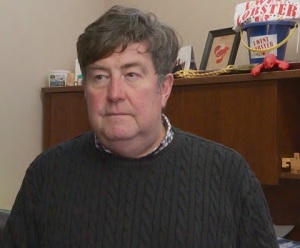
Coronavirus: Most P.E.I. lobster fishermen want spring season to go ahead
The P.E.I. Fishermen’s Association conducted the survey starting last week, and got responses from 775 of 954 members who fish the spring lobster fishery — a more than 80 per cent response rate. When asked whether the spring season should proceed “considering what you know today on the current spread of COVID-19,” 57 per cent said yes. Then, in a separate question, members were asked whether the PEIFA should request DFO delay the opening of the 2020 season, and 70 per cent said yes. Ian MacPherson, executive director of the PEIFA, said the survey was an effort to gather feedback from fishermen, rather than a binding vote on whether to ask DFO to delay or cancel the season. “It’s a complicated issue,, >click to read< 17:56
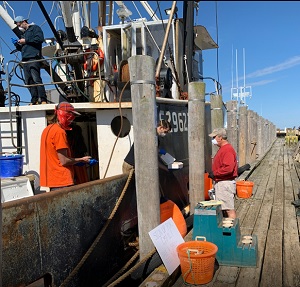
Unmoored and unsure, fishermen make do – Direct boat sales stem the tide for some.
Saturday, folks came to Menemsha to buy directly off the decks of local scallop boats. Business was brisk. Captain Sam Hopkins, aboard the Endurance, mongered to a steady queue of masked customers. Like the nearby Martha Rose, sea scallops off the Endurance sold for $15 per pound. “It was really nice to have some local support and have people who bought scallops right off the boat,” Hopkins said. Lobsterman Jason Gale has also turned to direct boat sales. From the deck of the Watch Out at Lake Street Landing he sold lobsters at $8 apiece, regardless of weight, on Saturday. Gale said he put a 10 lobster cap per customer and sold out. photos, >click to read< 15:59
Athearn Marine Agency Boat of the Week: 39′ BHM Dragger/Lobster, 435HP Volvo, Nextgen 3.5 KW
To see specifications, information and 26 photos, >click here< Vessel is in good condition. To see all the boats in this series, >click here< 12:46
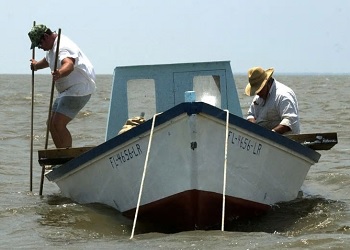
Florida warns of Apalachicola River’s ‘doom’ if Georgia isn’t forced to release more water, Looks to US Supreme Court
Warning that a special master’s recommendation would “spell doom” for the Apalachicola River, Florida wants the U.S. Supreme Court to require Georgia to share more water in a river system that links the two states. “The harm to the Bay’s oyster fisheries is undeniable. Apalachicola is renowned across America for its oysters, which account for 90% of Florida’s oyster harvest and 10% of the nation’s,” “What’s more, oysters, and oystering, have created a distinct way of life in Apalachicola passed down from generation-to-generation; whole communities depend on the fisheries for their economic livelihood. The oyster is to Apalachicola what the lobster is to many New England towns.” >click to read< 10:23
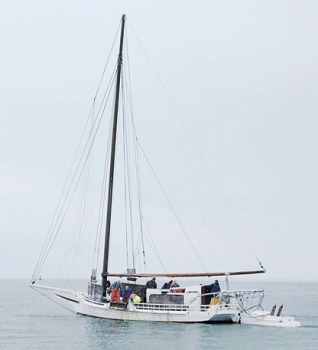
Last of the Chesapeake Skipjacks
Over the course of a Chesapeake Bay waterman’s life, big memories tend to swallow smaller ones. So when seventy-two-year-old Harold “Stoney” Whitelock looks back on his childhood now, it’s all misty images of water and boats, and little else. “That’s all my family talked about at Sunday dinner,” he says. “Boat this and boat that.” Whitelock is one of the bay’s last skipjack captains. Long, shallow wooden boats with tall, wide sails, skipjacks survive as the only commercial sailing vessels left in North America. The nine or so (by Whitelock’s estimate) still used to dredge for oysters all concentrate here on Maryland’s toothy Eastern Shore, kept afloat by a couple of dozen people who speak with a distinctive brogue that’s fading by the generation, too. >click to read< 09:27
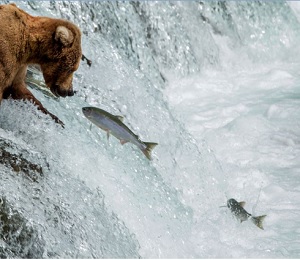
Coronavirus: Specter of overescapement shouldn’t influence fisheries decisions
The management of sustainable salmon fisheries in Alaska is based on a ‘fixed escapement policy’ where the goal is to allow enough salmon into our rivers and lakes to fill the spawning habitat, and on average produce maximum or optimum long-term fishery yield. When more fish enter streams than targeted by escapement goals, this is referred to as ‘overescapement’ by fishery scientists and managers. So then, if salmon fisheries are restricted in the summer of 2020 due to the COVID-19 crisis, will the resulting ‘overescapement’ cause damage this year, or in future years, to salmon or their ecosystems? >click to read< 07:52
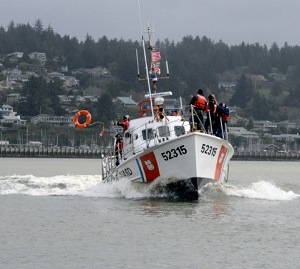
Coast Guard completes 13-hr overnight tow of fishing vessel offshore Port Orford, Ore.
A Coast Guard 52-foot Motor Lifeboat crew towed a disabled 68-ton commercial fishing vessel Tuesday morning across the Coos Bay Bar, west of North Bend. Watchstanders at Coast Guard Sector North Bend received a report at 3:38 p.m. Monday that the 61-foot fishing vessel Pacific Faith, with four people aboard and 10,000 pounds of fish, experienced a loss of power about 9-miles west of Port Orford and were drifting south. A Coast Guard Station Coos Bay 47-foot Motor Lifeboat crew launched at 4:47 p.m. and arrived on scene at 7:13 p.m. The MLB crew towed the Pacific Faith for 12 hours; mitigating fatigue during that time by rotating positions. >click to read< 06:28
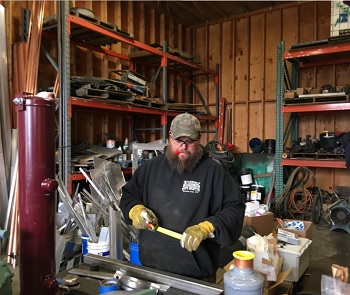
Coronavirus: Restaurant Closures Put Oregon Seafood Industry In Limbo
Commercial fisherman Clint Funderburg should be on the ocean right now, catching Dungeness crab on his fishing boat, the Widgeon. When crab prices tanked a few weeks ago, he shifted gears to his off-season side gig. So, he’s building a refrigeration system for one of the many fishing boats that are stuck at the dock right now. Mandatory restaurant closures during the coronavirus pandemic have sent shock waves through Oregon’s $700 million seafood industry. The overwhelming majority of the seafood that lands on Oregon’s docks gets eaten in restaurants, and no one knows when that market will return. In the meantime, fishermen are parking their boats as seafood prices plummet. >click to read< 18:04
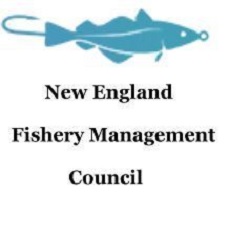
Council delays vote on at-sea monitoring
Meeting solely via webinar, council members voted 12-5 to postpone final action on Amendment 23 beyond its June meeting, when it expected initially to vote. The amendment will set at-sea monitoring levels in the Northeast Multispecies groundfish fishery. Many of those voting for the postponement expressed concern that fishermen have enough on their plate managing the economic and social impacts of the pandemic without having to deal with the complexities of the amendment and the need to develop public comment. “My day job is working with commercial groundfishermen and I can assure all of you, when I’m on the phone with them, it’s COVID-19 related, not Amendment 23-related,” said council member Libby Etrie. >click to read< 16:10

Court Finds American Lobster Fishery Requires Incidental Take Statement for Impacts on North Atlantic Right Whale
As commercial fisheries across the United States continue to adjust operations in the face of new legal requirements, such as the shift from single-species to ecosystem-based management, one challenge in particular has dominated the courts: the Endangered Species Act (ESA). Recent court decisions have vacated commercial longline fishing permits in federal waters off the coast of California that could endanger the Pacific leatherback sea turtle and restored prohibitions on gillnet fishing gear in a known New England feeding ground for the endangered North Atlantic right whale. This trend continued on April 9, when a federal district court judge in Center for Biological Diversity,,,The American lobster fishery is managed cooperatively by the Atlantic States Marine Fisheries Commission and NMFS, >click to read< 14:45
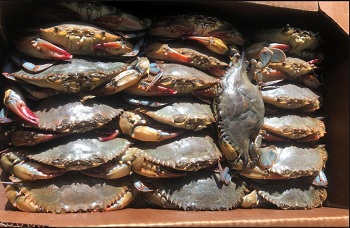
Soft-shell crab season is ‘the start of all the good stuff’
One local delicacy seafood is quite popular in the Lowcountry this time of year. Soft-shell crabs, or female blue crabs, are being caught, sold and cooked in homes and restaurants along the state’s coast. Callinectes sapidus or “beautiful swimmers” are more commonly referred to as Atlantic blue crabs. Although they can be caught all year long, the peak molting, or shedding process, of a female crab’s exoskeleton to create the soft-shell normally occurs during the springtime in South Carolina saltwater. “The timing is dictated by the crabs, and when they molt is really dictated by water temperatures. So in our waters, molting can occur year round, but the peak of molting for these females is really in the April-May,, photo’s, >click to read< 13:52
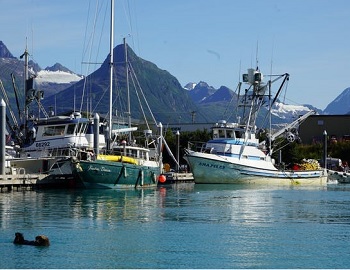
While coronavirus threatens seafood economy, community fisheries find ways to stay afloat
Major commercial fisheries, including the iconic Maine lobster fisheries, have ground to a halt.,, Consider the lucrative Pacific halibut fisheries, which opened in mid-March. These fisheries largely serve fine dining restaurants. Combined with the loss of sales to markets like China, seafood producers from east to west are without a market for their product. Combined with the loss of sales to markets like China, seafood producers from east to west are without a market for their product. But decades of globalization, industrialization and environmental change have brought many coastal communities to the brink, because of coastal development, climate change or they’ve lost fishing rights to industry consolidation. To meet this moment, many need more than just an invigorated customer base. >click to read< 12:16
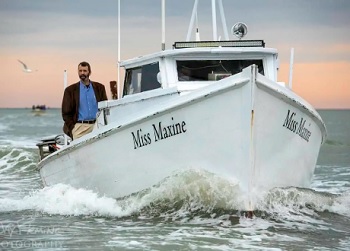
Smith Island Holds “Boat-in” Easter Service
On Easter Sunday, six boats from the three Smith Island, Maryland communities gathered around Pastor Everett Landon aboard the Miss Maxine, his father’s wooden workboat, in the sheltered waters off Easter Point. Pastor Landon addressed the floating congregation over channel 78 on VHF marine radio as the sun came up over Tangier Sound. Families who were not able to attend the ‘boat-in’ service tuned in through their at-home VHF radios. >Click through the gallery below to see images of the Easter boat-in< 10:20
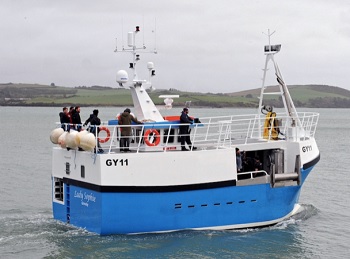
Lady Sophie – Focus on shellfish
Made to harvest for shellfish for Grimsby company Fastline Shellfish, Lady Sophie has been built in Padstow to a new 12 metre design. Owners Fastline Shellfish are a family-owned business that has bee trading on the Grimsby docks since 2009, although the Kenyon family’s roots in the fishing industry go back a long way. Aiming to supply top-quality fresh shellfish, the focus is on cutting short the supply chain by catching its own crabs, lobsters and whelks, which are processed and supplied through the Fastline shop. video, photo’s, >click to read< 09:42
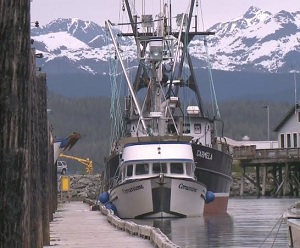
Coronavirus: Copper River salmon fishery nears without travel restrictions from Cordova City Council
As of Monday, commercial salmon fishing operations in Cordova are moving forward with few protections in place for residents beyond statewide health mandates.,, Although it is not business as usual for fishermen preparing for the mid-May opening, some people in the community fear that not nearly enough has changed to protect the town from a coronavirus outbreak.,, Some fishermen who spoke against the travel hold said that restricting travel would disrupt plans for their crews to travel to the area and complete a 14-day quarantine before the start of the season.,, “Not everyone is going to see the situation the same,” Lange said. “A fisherman by their very nature, one, they’re optimists. Two, they’re very independent. And three, they see the world through a very narrow focus, >click to read< 08:23
State overrules Wrangell, says it can’t add its own COVID-19 restrictions – Wrangell’s proposed restrictions on people arriving at the island community have been shelved after the state said the Southeast city doesn’t have the authority. City leaders had wanted to coordinate the flow of commercial fishermen and fish plant workers expected to arrive for the season. >click to read< 08:56
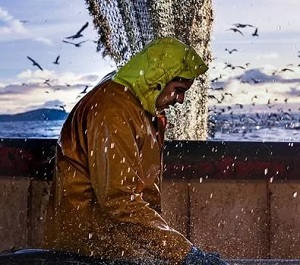
Distraught UK fishermen face wipe out over coronavirus and EU
The British fishing industry could be “wiped out” because of the coronavirus outbreak keeping fishermen from selling their products to the wider public. The British and Scottish Governments have both issued guidance and rolled out new policies in a bid to help the fishing industry survive the crisis but fishermen have warned their policies may not be enough. Scottish trawler Alistair Sinclair told the Today programme: “We don’t really know what is ahead of us. “There’s no light at the end of the tunnel. We may get to the point where boats are of little value. “Everything we’ve worked for through our life to get where we are today could be erased like rubber on a piece of paper.” >click to read< 07:21






